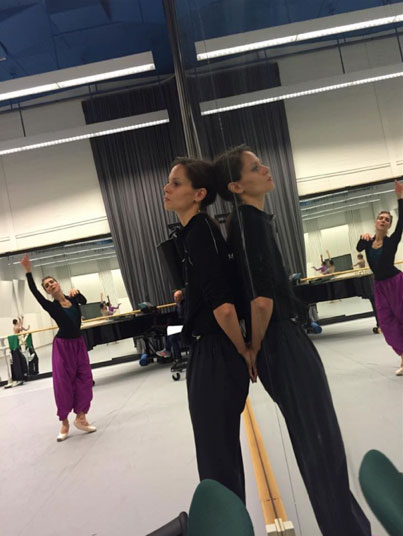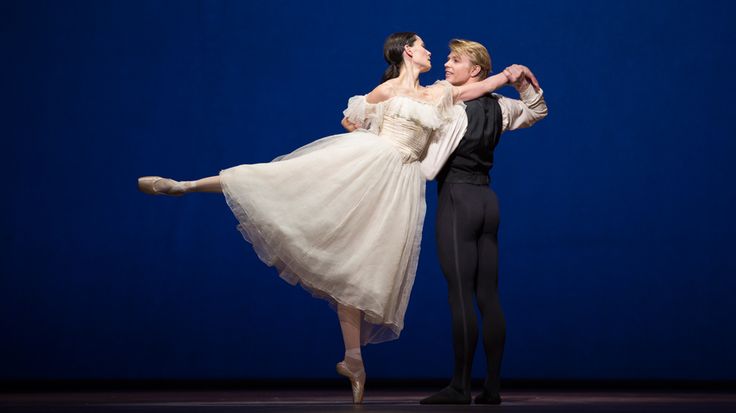
Iconic Dutch Ballerina Igone de Jongh talks to fellow Royal Ballet School alumnus Matthew Paluch exclusively for balletposition.com
When you enter the Muziektheater in Amsterdam you know immediately who the First Lady is. Her image is everywhere from press cuttings and digital screens to posters.
Igone de Jongh is the Prima Ballerina du jour – has been for a while and isn’t going anywhere soon. We managed to sneak thirty minutes out of her hectic schedule to have a quick chat. She’s a dancer, wife, mother and recent TV star, so there’s a lot to discuss.
Her diverse career is of most interest as the muse of the Dutch master Hans van Manen. She’s created many works with him, as well as being in the opening night cast of existing pieces.
“My relationship with Hans (…) didn’t start straight away because I was young.” Explaining
the importance of continuity, she said: “You cannot have this with any choreographer, anywhere in the world, if you go from place to place.”
Not that it wasn’t contemplated – in fact, a move to America was very much on the cards at one point: “l‘ve tried to leave… I’ve auditioned.” I asked why. “To see something else.” But thankfully for dance in the Netherlands she stayed put.
de Jongh and I were peers at the Royal Ballet School in the mid-90s. She arrived so different from everybody else: tall, extraordinary line, technically proficient and with a natural coordination that made her very watchable.
London had come about after an invitation post-Prix de Lausanne: “I was very excited… I was very honoured, I really wanted to get into the Royal Ballet but they didn’t take me. When I didn’t get the job I was devastated… really really devastated.”
She remembers calling her mother and saying, “I want to come home, I want to come home.” And that she did, though she still regards the experience as “really useful for me as a teenager…to get away from the country.”
It shaped the artist we see today.
At 36 her career is peaking and shifting at the same time. When asked if she didn’t feel the need to do certain repertoire anymore, within a millisecond she exclaimed Swan Lake without a flinch.
She’s currently coaching the junior/main companies
 “I love it because finally I feel I can give something back. I’m very happy its not about me, because it makes me very nervous when its all about me all the time. I really feel like I’ve got something to say – I can help them.”
“I love it because finally I feel I can give something back. I’m very happy its not about me, because it makes me very nervous when its all about me all the time. I really feel like I’ve got something to say – I can help them.”
And watching, it’s clear her decisive yet generous persona is greatly appreciated from the studio floor.
I asked for her advice from the unique perspective of a senior principal on training for both students and professionals: “Do class everyday till the end. Full class. Six days a week. For me it’s really key. I see people get injured because they come in cold and just do a ballet (…) and if I have time yoga; the hot [Bikram] yoga.”
de Jongh is a public figure, but clearly it’s the intimate studio experiences that propel her to continue to dance, be these with van Manen, partners or visiting choreographers.
The recent acquisition of Neumeier‘s La Dame aux Camélias by Dutch National Ballet was one of those cherished moments both with Neumeier himself and her Armand, Marijn Rademaker: “We have this intimacy without really talking about it – it’s just there. For my heart and my soul as a ballerina, he ‘s the one I’ve been waiting for for a long time. He could be a reason for me to dance longer.”

Intimacy seems paramount in her work. Of van Manen she said: “I don’t care what the audience thinks, or what the papers are going to write, l want him to be happy. We are so close, if he’s not happy he’ll tell me (…) The only thing that’s important to me is his opinion in his ballets.”
de Jongh’s career is the stuff of dreams, but a juggling act also: “I’m making it work as I go along. My family is obviously in my heart number one, but so is my dancing. The TV thing is new to me, but l’m enjoying it because it’s been a very good experience so far and it’s something else, and I’ve never done anything else. When I think about retiring I don’t know… I don‘t think I’m ready to retire now, but l don‘t think I’ll dance another ten years – no way! I want to keep on teaching because I really enjoy it.”
Dutch National Ballet – and Holland, in fact – have nurtured de Jongh from the get go. And when this strong, yet unassuming leader takes the reins fully, Dutch dance can be assured of a glowing future.
E N D
